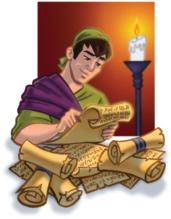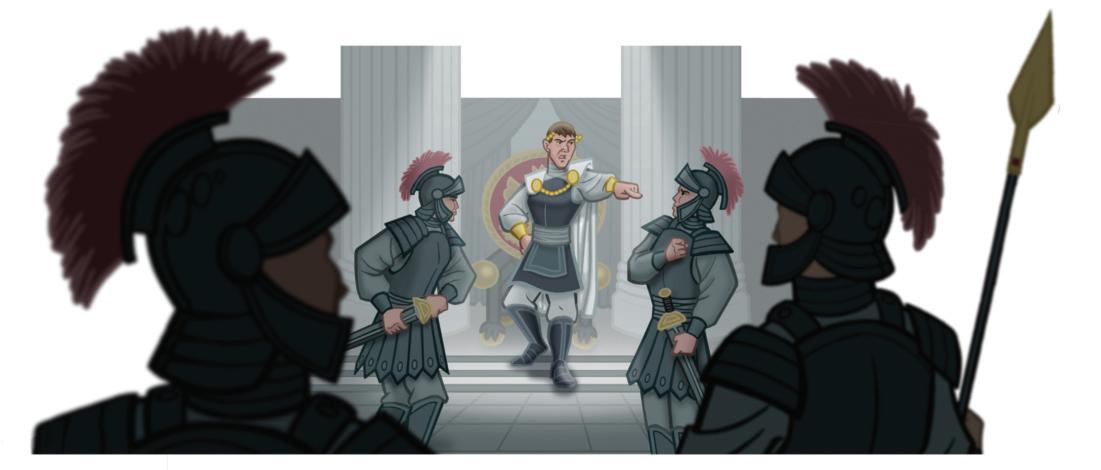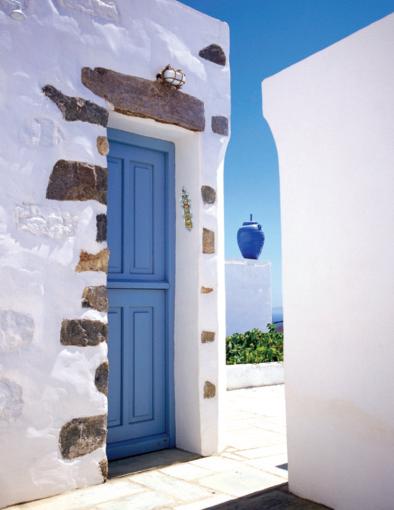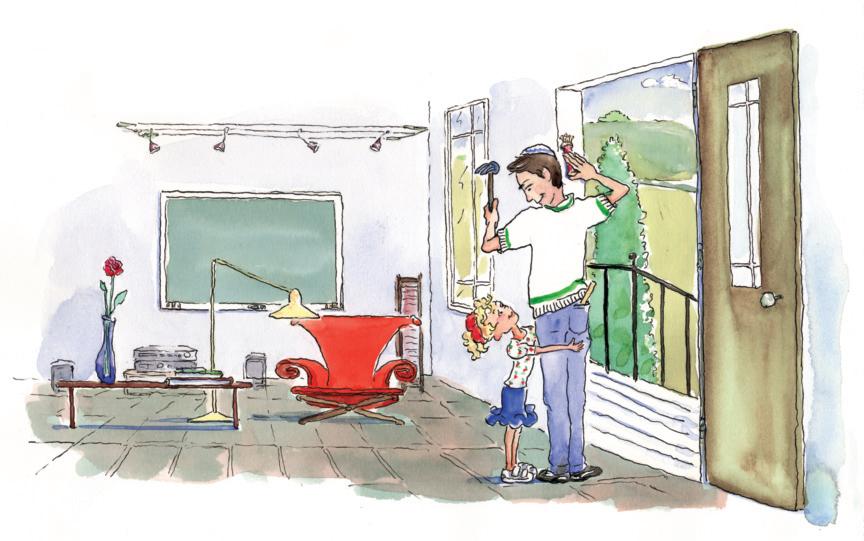mezuzah
THE ULTIMATE HOW-TO GUIDE AND INTRODUCTION


THE JEWISH LIFE SERIES: WISDOM THAT INSPIRES

THE ULTIMATE HOW-TO GUIDE AND INTRODUCTION


THE JEWISH LIFE SERIES: WISDOM THAT INSPIRES
A mezuzah is a specially written parchment scroll that contains portions from the Torah speaking of God’s oneness and other basic elements of faith. The mitzvah* of mezuzah is performed by attaching this scroll (placed in a protective case) to every doorway in one’s home. The mezuzah reminds us of God’s presence when we are at home and when we travel out of our home. The mezuzah also provides protection for the home.
And you will write these words on the entrances of your house and your gates
U’Ktavtam al mezuzot beitecha u’visharecha
Above: The verse containing the Biblical command (Deuteronomy 6:9) of Mezuzah. *There are 613 commandments (or mitzvot) in the Torah.
The mezuzah must be written on parchment specially prepared for the purpose of writing the scroll and come from a kosher animal.

The mezuzah serves as a protection for one’s home.
There are numerous laws governing the writing of each and every letter; a single mistake can invalidate the whole scroll.
According to the laws of mezuzah, the text on the scroll must be handwritten in order, from start to finish.
One of God’s names, connoting protection, which appears on the outside of the rolled up mezuzah scroll.
Another of God’s names which appears on the outside of the rolled scroll.
Above: The mezuzah scroll. The scroll will be rolled up and inserted in a case affixed to one’s doorpost. Please note the spelling of God’s name has been slightly altered in the picture to protect the sanctity of the name. Translation can be found inside back cover spread.


What’s Mezuzah all about? A story from the Talmud. Onkelos, the son of Kalonymous converted to Judaism. The Roman Emperor (Caesar) Hadrian, Onkelos’ uncle, sent a company of soldiers after him. Onkelos drew them into a discussion about the Torah and converted them. Caesar sent a second company of soldiers, but this time he warned them, “Don’t speak with him!” When they took him into custody and were about to go, Onkelos said to them, “Let me say just one thing! The Torchbearer holds a lamp for the Chief. The Chief holds a lamp for the Captain. The Captain holds a lamp for the Commander-in-Chief. The Commander-in-Chief holds a lamp for the King. Does the King hold a lamp for any man?” “No,” they replied. “Well,” Onkelos continued, “God held a light for Israel,



as it is written, ‘God went before them by day with a pillar of cloud, to guide them along the way; and by night with a pillar of fire, to give them light…’ (Exodus 13:21).” The entire company converted. Undaunted, Caesar sent another company of soldiers after them, and warned them, “Do not speak with him. Don’t even exchange a single word!” When they took him into custody and were about to go, Onkelos set his eyes on the Mezuzah on the doorpost. He placed his hand on it and laughed. They asked him, “Why are you laughing?” He replied, “Normally, a king sits within while his servants guard him from without. This is not the case with God. His servants are within while He guards them from without, as it is written, ‘God will guard your going out and your coming in from now until eternity’ (Psalms 121:7).” They converted as well, and Caesar did not send any more soldiers.


The root of the word mezuzah is zaz, meaning “movement.” The mezuzah is a reminder, as we move from place to place within our homes, as well as when we leave our homes and move through the world at large, to remember God is in all the many different places we may find ourselves.
We build homes and live in them so that we may be protected from the elements. The mezuzah on our front door transforms a mere physical dwelling into a sacred space wherein we can nourish the values and truths that build strong families and healthy individuals. Affixing the mezuzah to the doors of our home elevates and sanctifies an otherwise temporary dwelling into a gateway to the eternal.
The mezuzah, handwritten till today in the age-old specially prescribed manner and affixed to the right doorpost of every room in the Jewish home, contains the first two paragraphs of the Shema prayer: “Shema Yisrael” and “Vehaya im shamoa.” These texts declare the Unity of God and express God’s assurance to us of the reward and blessing that will result from our observance of the Torah’s teachings, as well as the results of not doing so. Our actions and choices make a difference.


“It is a positive commandment to write the Torah portions of Shema and Ve’hayah, and to affix them to the doorposts of one’s house. One should be extremely careful regarding this commandment, for whoever is careful in this respect will increase their longevity and the longevity of their children as it is written, ‘so that your days and your children’s days will be prolonged on the land that God swore to your ancestors’…”
Shulchan Aruch, Yoreh De’ah 285:1.
The Biblical passages written on the mezuzah scroll embody the fundamental convictions of the Jew that:
• God exists and is one
• God knows everything that goes on in the world
• Our actions carry great meaning and we have responsibility for them
• God participates and actively guides everything that occurs in the world.
When you leave the safety and protection of your home to face the outside world, you go with the kiss of the mezuzah on your lips. You take God along with you to whatever the day holds in store. It implies the courage and determination not to be swayed by place or circumstance and stand fast (be “affixed”) in our truth, a trait going back to the forefather Abraham.
Abraham our forefather was called “Ha’ivri”. One of the definitions of Ha’ivri means “on the other side.” Abraham was called “Ha’ivri” since he lived on the other side of the Euphrates River.
On a deeper level, Abraham was called “Ha’ivri” since he had the strength to oppose (stand on the other side of) a world mired in selfishness and idolatry. Abraham stood up against mighty Kings of ancient times and was victorious. No force in the world be it physical or spiritual, could sway Abraham from his faith in God and his mission of bringing love, kindness and healing to the world.

Some of the deepest teachings of Kabbalah concern the divine names of God. The names of God represent different aspects of and ways of knowing God and are also tools which God used in the creation of the world. In the mitzvah of mezuzah, the Divine Name “Shaddai” figures prominently.
The Divine Name Shaddai is written on the outside of the mezuzah scroll. While the writing on the inside of the scroll is hidden because it is rolled up, the one word that can be read on the outside of the mezuzah is the Divine Name Shaddai
As the Kabbalistic Master, Rabbi Isaac Luria indicates, this Name has the power to protect a person from all harm, including the harm that comes from one’s own subconscious.
In this sense, the Name Shaddai can be read as an acrostic for “Shomer Daltot Yisrael” which means “Guardian of Israel’s Doors”or “Shomer Darchei Yisrael” meaning “Guardian of Israel’s Paths”.
In the Talmud, we are given one of the meanings of the Name Shaddai. It stands for: “Mi SheAmar Dai Le’Olamo – He Who said ‘Enough’ to His World.” In other words, as God was creating the world, He stopped the process at a certain point, holding back creation from reaching its full completion. This restraint gives us the space to become partners with God and “complete” the work of creation.
We see from this the Divine Name Shaddai has the mystic power to place boundaries and limits. This same power of placing a boundary resides on our doorposts and has the ability to stop negative energies from entering.
This power is also hinted at, in the word mezuzot. The kabbalah teaches, when the letters of this word are rearranged, they spell zuz mavet - death will flee. Harmful and destructive forces see the mezuzah and run away. God Himself is watching.

Many have the custom to place the mezuzah on a slight diagonal with the top pointed slightly inward (see picture). Some (usually of middle eastern or oriental descent) have the custom to place the mezuzah pointing straight up.
Place the mezuzah anywhere from at least 2/3 up from the bottom of the doorpost (but no closer than a hand's breadth from the top).
The mezuzah must be purchased from a reliable source. This is crucial to ensure one is getting an authentic, kosher scroll.
The scroll (without a case) should cost no less than approximately $30. If one has the means, it is praiseworthy to purchase as beautiful a scroll as one can.
After purchasing the scroll, many will purchase a beautiful case that suits their taste.
Mezuzah is a command incumbent upon women and men.


(The to
Be sure to place a mezuzah on every doorway in your home (except bathrooms).
If you only have one or two mezuzot you should not delay putting them up. Attach the mezuzot immediately and when you buy more you can place them. (The mezuzah should only be put up in the daytime.)
Mezuzot should be inspected by a reliable scribe at least twice every seven years to make sure none of the letters have worn down - thereby invalidating the scroll
THREE EASY DO-IT-YOURSELF STEPS TO PERFORM THE MITZVAH OF AFFIXING A MEZUZAH TO YOUR DOORPOST
1
Purchase a kosher mezuzah scroll from a reputable dealer. The scroll must be written and inspected by a knowledgeable and conscientious individual familiar with the many laws governing the writing of the scroll. This is critical; one can only fulfill this mitzvah with a kosher scroll.
2
3
The mezuzah (the scroll in its case) should be affixed at least 2/3 up from the bottom of the right doorpost (see picture for placement). Take a hammer and nails or, in the case of a steel entryway, a firm adhesive, hold the mezuzah above the area you will attach it to but do not yet affix.
While holding the mezuzah above the area it will be attached to, have in mind to fulfill the Torah command of mezuzah and make the blessing written below. (In whatever language you are comfortable with, hebrew is best, but reading the transliteration or english is fine as well.) After saying the blessing, affix the mezuzah. That’s it!
Baruch Atah Ado-nai, Elo-heinu Melech Ha’Olam Asher Kidishanu B’Mitzvosav, Vitzivanu Likboa Mezuzah.
Blessed are you God, King of the World who has sanctified us with his commandments, and has commanded us to affix a mezuzah.

A brief glimpse at some of the sources for this booklet
Babylonian Talmud: Based on the Mishna completed in the third century CE by Rabbi Yehuda the Prince. The Mishna was the first written compilation of the Oral Law given to Moses at Sinai. It consists of highly condensed teachings explaining the laws of the Torah. The Talmud, compiled in Babylon about 5th century CE by the sages Ravina and Rav Ashi, is an elaboration and explanation of the teachings of the Mishna.
Jerusalem Talmud: Also based on the Mishna. Composed in Tiberias, the last place the Sanhedrin (Jewish Court of Law) sat. It was called the Jerusalem Talmud because the rightful home of the Sanhedrin was in Jerusalem.
Maimonides: Moses son of Maimon, born 1135 in Cordoba, Spain. One of Judaism’s most outstanding scholars in addition to being a well-known doctor much in demand by the royalty of the day. Most famous for his Mishna Torah, a codification of the legal decisions of the Talmud.
Proverbs: Written by King Solomon, 848-796 BCE, known as the wisest of all men in history. The Book of Proverbs consists of analogies and parables concerning wisdom and its acquisition, and how to navigate through this world.
Recanati: Rabbi Menachem Recanati. Great 14th Century Italian Kabbalist. Authored a mystical commentary on the Torah known as the “Recanati.”
Shulchan Aruch: An authoritative compendium of Jewish Law composed by Rabbi Joseph Caro of Safed in the 1560’s. The words “Shulchan Aruch” literally mean “a set table.” The work seeks to set out Jewish law in a “prepared” accessible way in one set of books in an attempt to obviate the need to go through multiple sources to derive the final halachic (Jewish law) ruling.

Reliable places where you can purchase a mezuzah
ISRAEL (Ships internationally)
Rabbi Avraham Yechezkel Lessin: 18 HaKablan Street, Jerusalem, Israel. Tel: 054-830-5773, aylessin@gmail.com www.aylessin.com
Hasofer: 10 Strauss Street Jerusalem, Israel. Tel: 972.2.538.3701 Fax: 972-2-538-8645, www.hasofer.com info@hasofer.com
USA (Most ship anywhere in the US)
Safra Judaica & Stam: 141-24 Jewel Avenue, Flushing, NY 11367 • 718.268.5151
West Side Judaica: 2412 Broadway, New York, NY 10024 •212.362.7846
Rabbi Z. Eisenbach: 41 Essex Street New York, NY 10002 • 212.674.8840
Partners in Torah: 1.800.STUDY.42 (Has program to give away mezuzot)
AUSTRALIA Golds Books: 9 O’Brien St. Bondi Beach 2026 Tel: (612) 9300.0495 Fax: (612) 9389.7345 sydney@golds.com.au
ENGLAND Rabbi Yitzchak Macmull: 28 Parkside Drive Edgware, Middlesex HA8 8JX England Tel: [0044] (020) 8958.8607
RESOURCES
www.MyZuzah.org: MyZuzah connects, projects and unites the Jewish people through the mitzvah of mezuzah. Learn more about kosher, fair trade mezuzot at wwwMyZuzah.org.

If you enjoy Mezuzah, check out The Tefillin Guide at jewishlifeseries.com Download a free PDF or purchase print edition
Hear O Israel, Hashem is our God, Hashem is One. And you will love Hashem your God with all your heart, with all your soul, and with all your might. Let these words that I command you today be on your heart. Repeat them to your children and speak of them when you are dwelling in your house and when you are traveling on the way, when you lie down and when you rise up. Bind these words as a sign on your arm [near your heart] and as tefillin [above your forehead] between your eyes. Write them on the doorposts of your house and your gates.
And if you carefully obey My commandments, which I am prescribing for you today, to love Hashem your God, and to serve Him with all your hearts and with all your souls, I will provide rain for your land in its season – powerful autumn rains and gentle spring rains. You may then gather in your grain, your wine, and your oil. I will also provide pasturage in your fields for your livestock. You will eat and be satisfied. Beware, however, lest your hearts be misled to turn astray and worship heavenly powers that others serve as gods and bow down to them. [To correct you] God will turn [His mercy into] fierce anger against you. He will close the heavens so there will be no rain, and the land will no longer yield its produce and you will quickly vanish from the good land that God is giving you. You should place these words of Mine on your hearts and on your souls. Bind them as a sign on your arms [near your hearts] and as tefillin [above your foreheads] between your eyes. You must also teach them to your children to speak of them when you are dwelling in your house and when you traveling on the way, when you lie down and when you rise up. You must also write them on the doorposts of your houses and your gates, so that your days and your children’s days will be prolonged on the land that God swore to your ancestors to give them when heavenly days are [again revealed] on the earth.
(Hashem means “the name” and is another way of referring to God.)

WISDOM THAT INSPIRES
FOUNDER: RABBI GARY SHEVA
The Jewish Life Series acknowledges Steven Moses Hazan and Family whose friendship and support have been instrumental in bringing this series to life.
Special thanks to board member JAY M. SHULTZ
for his friendship and assistance in advancing this project, as well as the Am Yisrel Foundation.
Special thanks to RABBI RAPHAEL BUTLER and the Afikim Foundation.
Special thanks to Joanthan & Elana Kaplan, Steven Hazan and Jonathan & Beth Bennett. This project would not have been possible without their friendship and support.
Thanks: James Oppenheim, David Asaf & Chaim Marcus for project assistance. Avraham Sutton for translation of Shema, Onkelos, diamond story, & editorial work. Hasofer Moshe Flumenbaum for mezuzah scroll picture and content. Moshe Lewin for content and comments. Izak, Dr. Shnayer Leiman & Professor Daniel Sperber for further assistance. Avraham Hersh-Borshevsky for cover picture of mezuzah. Eliot Bour & Saul Blinkoff for illustration of Onkelos story. Yael Hershberg for illustration of instructions. Thanks to Steve Rubinger for use of coin image www.antiquainc.com. Designed & written in Israel.
© 2019 The Jewish Life Series Foundation
The Jewish Life Series would like to thank THE KESTENBAUM FAMILY for their help in the initial publication of the mezuzah book Chani and Jay Kestenbaum in honor of their children and grandchildren Jonathan and Michal Kestenbaum, Julia, Eli and Ilana Heidi and Jonathan Talansky, Marc and Rebecca Danielle and Yehoshua Robinson Yosef Dov, David, Etan, Benjamin & Joseph
Arteban, gave Rabbi Yehudah the Prince a priceless pearl. He said, “Can you give me something as precious as this in return?” Rabbi Yehudah sent him a Mezuzah.

Arteban complained, “I give you something that is priceless, and you give me something that has the value of a small worthless coin!” Rabbi Yehudah replied, “All your possessions and all my possessions together cannot compare to it! And furthermore, you gave me something that I must guard, whereas I have given you something that guards over you even while you sleep!”
Concerning this it is written, “When you are walking, it will guide you; when you lie down, it will guard you…” (Proverbs 6:22).

